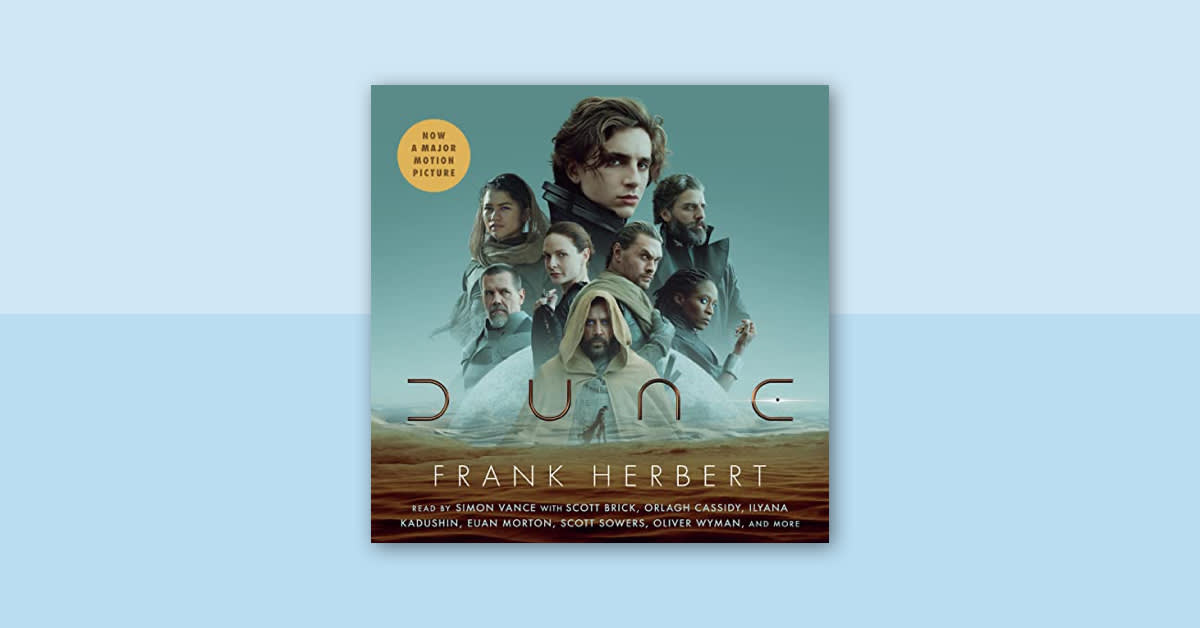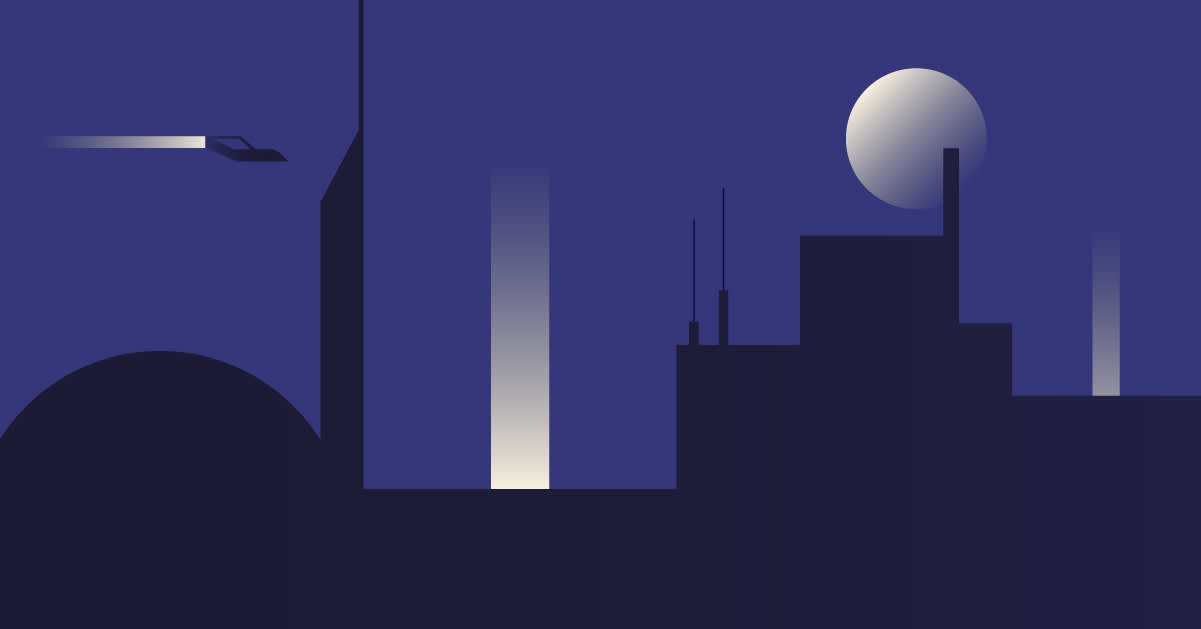One of the pleasures of listening to sci-fi books is the ideas they explore, from artificial intelligence to space travel and alien species. Beyond raising fascinating possibilities, the best works of science fiction ask big questions: What does it mean to be human? What will the future look like? What mysteries does the universe hold, and what do they mean for life on Earth? Sci-fi, as a medium, is incredibly well-suited to tackle complex and thorny issues while also telling riveting, imaginative stories.
And those riveting, imaginative stories are part of what makes sci-fi books such great candidates for film and television adaptations. Humans may not have figured out interstellar travel yet, but we can do some amazing things with special effects. There's nothing quite like seeing a favorite sci-fi story brought to life on the big screen, watching a director's interpretation unravel, from the barren landscape of a desert planet to a futuristic spaceship to diverse extraterrestrial life forms.
From 2001: A Space Odyssey to 2021’s acclaimed adaptation of Frank Herbert's Dune, the past 50 years have been full of cinematic sci-fi sensations. This list includes some of the most famous sci-fi adaptations out there, as well as plenty of hidden gems. You'll likely have heard of most of these movies, but you might be surprised to learn about the short stories, novellas, and novels they're based on. Use this list as a jumping-off point, an invitation to exploration. Many of these films have sequels and spinoffs, as do many of the books they're adapted from. There are worlds upon worlds out there to discover—these entries are merely the beginning.
Many adaptations, including the famous 1938 radio broadcast
H.G. Wells’s classic science fiction novel about Martians invading England has been adapted many times. First serialized in 1897, the book has remained popular over its 120+ year history, never going out of print. Narrated by an unnamed protagonist, the book recounts the Martian invasion, the ensuing war, and its aftermath. The War of the Worlds has been adapted into several feature films, television series, comics, and video games. Perhaps the most infamous adaptation is the 1938 radio broadcast narrated and directed by Orson Welles. It presented the novel as a series of news reports, and, according to some sources, many Americans listening to the broadcast believed the news was real and became terrified that Martians were truly invading Earth. It's impossible to say how much panic actually occurred, but the iconic story endures. More recently, Steven Spielberg directed a 2005 film version of the book, starring Tom Cruise and narrated by Morgan Freeman.
Film adaptation directed by Ridley Scott, released in 1982
The classic sci-fi movie Blade Runner is an adaptation of Philip K. Dick's 1968 novel, Do Androids Dream of Electric Sheep? The story is set in a dystopian Los Angeles in the year 2019. A powerful corporation has begun engineering synthetic humans, known as replications, to work in their vast network of space colonies. When a group of rebellious replicants escape from the colonies and return to Earth, it's up to a down-and-out cop (Harrison Ford) to hunt them down. While the movie was not hugely successful on its 1982 release, it has since become a cult classic, and is often cited as one of the greatest sci-fi films of the 20th century. A sequel, Blade Runner 2049, directed by Denis Villeneuve, came out in 2017.
Dune is arguably the best known sci-fi novel of all time. Set in a bleak future in which powerful families hold planetary fiefdoms, the story follows Paul Atreides, a young nobleman whose family controls the desolate desert planet Arrakis—the only known source for a sought-after drug—and the ensuing political, religious, and technological upheavals as rival nobles fight to overtake it. Dune won both the Hugo and the Nebula for Best Novel, and the audiobook won the Audie Award for Science Fiction. Herbert wrote five sequels, and several more books in the Dune saga, a collaboration between his son, Brian Herbert, and sci-fi writer Kevin J. Anderson, were published after his death. The first major film adaptation came out in 1984, starring Kyle McClanahan as Paul. Though a box office flop, it has since become a cult classic, and a new Dune movie was released in October 2021, starring Timothée Chalamet as Paul. Bringing the sci-fi classic back into the spotlight, the film won six Oscars with a sequel, Dune: Part Two, released in 2024.
Film adaptation directed by Paul Verhoeven released in 1997, plus its four sequels
Starship Troopers is a military space opera by Robert A. Heinlein, set sometime in the 23rd century. It follows the career of Johnny Rico, a soldier who enlists in the Mobile Infantry division of the United Citizen Federation's army. Earth is involved in an ongoing war with an alien species known as Arachnids. As he advances from recruit to officer, Johnny experiences the horror of the war firsthand, and becomes more and more indoctrinated by the government's propaganda. The first film adaptation was released in 1997. The franchise has grown to include two live-action sequels and two animated sequels, all released between 2004 and 2017.
Theatrical adaptation released in a series of four films, from 2012 to 2015
If there's a sci-fi/dystopian juggernaut that set the tone for young adult literature to come, it's Suzanne Collins's The Hunger Games. This dystopian trilogy is set in a future North America. The country of Panem is ruled by a fascist government wherein 12 poorer districts are controlled by the wealthy capital. Each year, two children from each district are forced to compete in a televised gladiator contest to the death, known as the Hunger Games. The series protagonist, Katniss Everdeen defies the authorities during the competition, sparking a revolution. The trilogy was turned into four movies, starring Jennifer Lawrence as Katniss.
Film adaptation directed by John Carpenter, released in 1982
Who Goes There? is a sci-fi horror novella by John W. Campbell, first published in 1938. It follows a group of researchers trapped on a remote Antarctic outpost. They encounter monstrous, shape-shifting aliens—creatures who have the ability to parasitically absorb other living beings, and then imitate their behavior. Panic ensues when the researchers realize they can no longer trust each other. The novella was first adapted in 1951 as The Thing From Another World. But it’s John Carpenter's 1982 adaptation, starring Kurt Russell, that’s better known and truer to the original plot.
Film adaptation directed by Denis Villeneuve based on the short story "Story of Your Life," released in 2016
Ted Chiang's inventive and beautiful collection of sci-fi stories explores questions of language, human nature, technology, creativity, and time. The titular short story is about Louise Banks, a linguist who is tasked with deciphering the language of the aliens who have just arrived on Earth. But as she begins to study this alien language, she finds it begins to change how she perceives herself, the world, and humanity itself. The story was adapted into a celebrated 2016 film, Arrival, which received eight Academy Award nominations and won the Hugo Award for Best Dramatic Presentation.
Film adaptation directed by Brad Bird, released in 1999
The Iron Man is a children's story written by poet Ted Hughes. It follows a mysterious being made out of metal, who suddenly appears in England and begins causing havoc by eating farm equipment. The Iron Man eventually befriends a young boy, and together they fight off a dragon, who, like the Iron Man himself, appears suddenly from space. The book was adapted into a beloved animated movie, The Iron Giant, in 1999. It too follows a young boy who befriends a metal giant but veers off significantly from the plot of the original.
Film adaptation directed by Steven Spielberg, released in 1993
Both Michael Crichton's 1990 Jurassic Park novel and the 1993 film adaptation are so deeply ingrained in the cultural consciousness that the question of which came first feels like a chicken-or-the-egg scenario. The best-selling and much-beloved novel did come first, but the film has since become a cornerstone of pop culture. Crichton's classic tale of danger and chaos on an island reserve of engineered dinosaurs has been terrifying and delighting readers, listeners, and viewers alike for 30 years. (For a deeper dive into Jurassic Park and its film companion, check out our book versus movie guide.)
Film adaptation directed by Doug Liman, released in 2014
All You Need Is Kill is a Japanese light novel that tells the story of a soldier with a serious case of déjà vu. After dying during a battle with aliens, Keiji Kiriya finds himself stuck in a time loop, repeating the same day over and over again. This gives him the opportunity to hone his fighting skills—and possibly change his destiny. It was adapted into the 2014 movie Edge of Tomorrow (also marketed as Live Die Repeat). The film keeps the central time loop plot of the original book, but instead of a soldier, it stars a public relations officer, played by Tom Cruise, with almost no actual combat experience.
Film adaptation directed by Stanley Kubrick, released in 1971
Both Anthony Burgess's 1962 novel and the 1971 film adaptation contain upsetting images and graphic violence. The novel is set in a dystopian future, in a UK plagued by intense state surveillance and a violent youth subculture. The protagonist, Alex, is the leader of a group of teens who commit a series of horrific crimes. Directed by Stanley Kubrick, the film stays true to the novel's dark themes and extreme violence. Though banned for a time in the UK, it is now widely recognized as a modern classic, and a polarizing one, both praised and critiqued for its nightmarish vision of the world to come.
Film adaptation directed by Steven Spielberg, released in 2002
“The Minority Report” is a sci-fi novella that was first published in the magazine Fantastic Universe in 1956. It tells the story of three people, known as precogs, who can foresee all future crimes. They work for a police division called Precrime, where officers use the information provided by the precogs to arrest suspects before they've even committed crimes. But when the head of Precrime is predicated to commit a murder in the future, he becomes convinced that the whole division is based on lies. Steven Spielberg's 2002 adaptation is only loosely based on the novella. It also follows several precogs who work for a specialized police unit, but introduces additional plot elements and subplots. Philip K. Dick's original story has been anthologized in the collection Minority Report and Other Stories, which is certainly worth a listen, especially for fans of classic sci-fi.
Film adaptation directed by Stanley Kubrick, released in 1968
No list of book-to-film adaptations would be complete without 2001: A Space Odyssey. Stanley Kubrick's 1968 film was adapted from the short story "The Sentinel" by Arthur C. Clarke. Clarke co-wrote the screenplay, and the film has since become a mainstay of 20th-century sci-fi. After discovering a strange alien monolith, a team of scientists embarks on a mission to Jupiter, accompanied by the sentient computer HAL, who is surely one of the most famous computers in cinematic history. Clarke then went on to write a novel, 2001: A Space Odyssey, after the film's release in 1968, making for a rather unusual case in which a story inspired a film that inspired a novel. A sequel, 2010: The Year We Made Contact, came out in 1984, based on Clarke's sequel novel, 2010: Odyssey Two.
Film adaptation directed by Alfonso Cuarón, released in 2006
From thriller writer P. D. James, The Children of Men is a dystopian novel that depicts a future world cast into chaos by human infertility. It opens in England in 2021, 26 years after sterility was mandated for all human males. With members of the last generation on Earth turning 25, the extinction of humanity is a looming, chilling certainty. The story focuses on Theo, a historian and cousin to England's powerful dictator. He is resigned to living out his life in apathy—until he meets Julian, a magnetic young woman who urges him to join her group of radical reformers. Both the book and the 2006 film explore themes of power and corruption, faith and redemption, free will, and hope.
Adapted into a Netflix series that ran from 2018–2022
Richard K. Morgan's cyberpunk novel is set in a future in which a person's consciousness can be easily transferred between bodies. This allows for not only interstellar travel over great distances but also immortality. Most people are now able to simply transfer their consciousness into a new body, called a "sleeve," when their old one dies. But complications associated with the process make it dangerous for all but the wealthiest. When a wealthy man dies—rather than being "re-sleeved"—private investigator Takeshi Kovacs is called in to solve the mystery. Netflix adapted the novel into a series in 2018, which ran for two seasons. The screen adaptation expands significantly on the world imagined by Morgan in the novel and its two sequels, Broken Angels and Woken Furies.

















